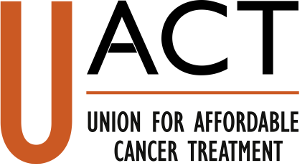24 April 2019 – Today the Department of Commerce’s National Institute of Standards and Technologies (NIST) released its Green Paper on Return on Public Investment. The Union for Affordable Cancer Treatment (UACT) strongly opposes this push by the Trump Administration to hamstring patient safeguards ensuring equitable and affordable access to medicines.
A draft Green Paper published on December 6, 2018 included proposals designed to narrow and even eliminate important safeguards in the Bayh-Dole Act. Those damaging proposals remained in the final publication.
The NIST proposals will harm patients seeking access to treatment and will instead protect the pharmaceutical companies that sell expensive drugs, vaccines, diagnostic tests and gene- and cell-treatments. If implemented, the proposals will exempt pharmaceutical companies from the obligation to ensure products are affordable and accessible, by enacting new regulations to further reduce the use of march-in and royalty-free rights in patents on federally-funded inventions, as well as by redefining the critical requirement that the invention be made, “available to the public on reasonable terms” such that the term “the public” means drug companies that sell products or services, and not consumers.
According to a press release issued by the NIST Public Affairs Office, in creating this Green Paper NIST “relied on extensive inputs from the private and public sectors, close coordination with OSTP and engagement with federal interagency working groups” as well as other entities. What the press release fails to mention is whether it consulted with any patient groups, and in particular with any patient groups that do not receive funding from pharmaceutical companies. The impact of these proposals will have the greatest impact on patients and their lives and health, so it is telling that patients do not seem to have been part of the consultation process.
The administration is trying to couch this in terms of increasing innovation, but in fact this is an attack on access to life-saving treatments for cancer patients, even in cases where the federal government has funded an invention. The U.S. government has leverage when it has funded a biomedical invention. It can use that leverage to protect patents from fiscal toxicity and to expand access. NIST is proposing to NEVER address excessive pricing, not matter what are the facts and consequences.
Among the practical examples where the government’s rights in patents can and should be used to lower prices of cancer treatments are in the cases of the prostate drug enzalutamide (trademark Xtandi), which was invented on US Army and NIH grants and sold in the U.S. by a Japanese pharmaceutical company at 5 times the price in Japan, as well as the new CAR T treatments sold by the Swiss company, Novartis, and by Gilead, at a cost greater than the price of a 3 bedroom home, and many other examples
Congress must act to stop this madness.
For more context from UACT on this issue, please see our earlier letter in response to a draft version of the Green Paper:
UACT Letter to Congress Regarding NIST Recommendations to Limit Bayh-Dole Act Safeguards. 26 February 2019.
